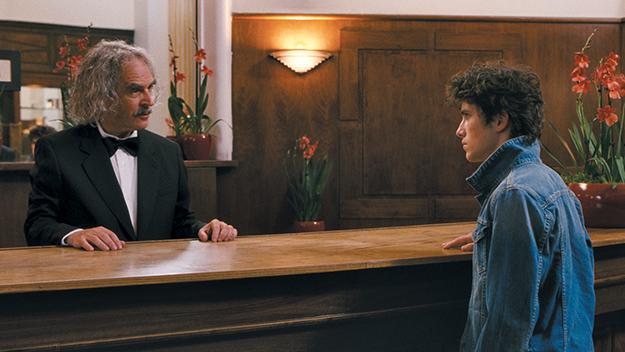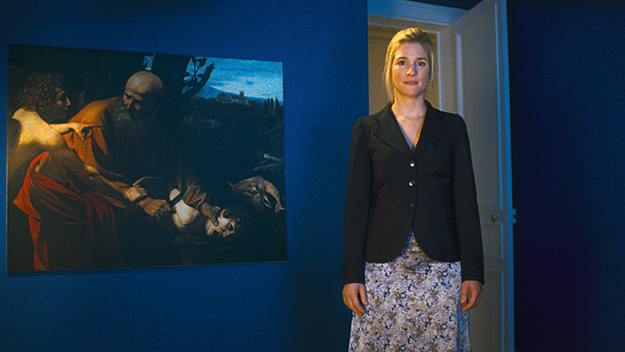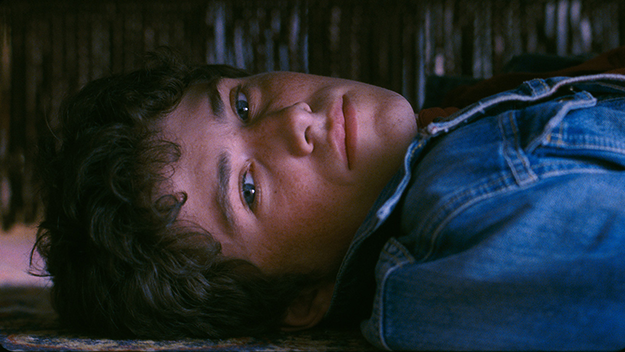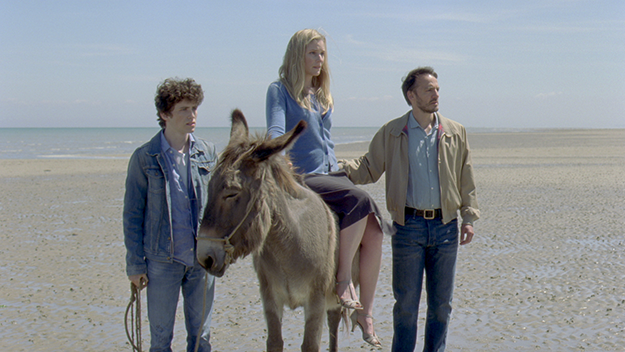A publisher’s wronged wife suspiciously picks up a pair of discarded black lace panties from her husband’s office floor. We know they’re his secretary’s, but the publisher, without breaking stride, says with absolute sangfroid: “That cleaning woman always leaves her things around.” In fact Mathieu Amalric delivers these words with barely inflected impassivity, and the first thing that struck me on hearing them was how differently they would be delivered in any other film. Think of the same line in, say, a mainstream French sex comedy, or a Woody Allen movie, or even a British Carry On farce, and you can imagine it being milked for its full comedic weight—you can imagine various flustered, overtly farcical readings, anything but the insouciant flatness it’s given in Eugène Green’s Son of Joseph. In the context of a film by French director Green, whose work can often be somewhat high-minded and scholarly, the line seems in any case like an utterly incongruous foreign body. But listen to it being spoken with formal coolness, and you realize how much delivery and inflection, or lack of inflection, can completely transform the most clichéd comic material. In Green’s hands, the old routine about telltale knickers is transformed into something preposterously stately—as if a low-brow sex gag had been sneaked into a performance of Racine. Son of Joseph—playing in the New York Film Festival on October 9 and 10 and the London Film Festival on October 13 and 14—is a strange and wonderful film by a strange and wonderful writer-director. Green is perhaps the ultimate acquired-taste filmmaker—you either take to his thing passionately, or you don’t get it at all—but Son of Joseph is arguably his most accessible film, certainly his most joyous. American-born—although he long ago reinvented himself as French, and tends to disparagingly refer to the U.S. as “la Barbarie”—he has since 2001’s Toutes les nuits developed an idiosyncratic form of cinema that makes its point of departure certain Bressonian techniques, notably an impassive acting style and formal staging that often features characters speaking directly to camera when they are in dialogue with each other. Some of his films are clearly classifiable as dramas—2014’s La Sapienza, the austere The Portuguese Nun (09)—while others are more openly comic. A few are poised on such a delicate knife-edge of irony, with a Brechtian touch, notably the self-reflexive mediaeval-quest narrative The Living World (03), that it’s hard to know exactly what we’re dealing with, other than the uniquely Greenian. Add to this a fascination with Baroque music, art, architecture and literature; a use of highly formal, anachronistic speech rhythms; and a most unfashionable preoccupation with spiritual, mystical, and religious themes, notably the elusive idea of “presence”; and you can see that Green is a filmmaker who establishes his own voice absolutely and invites viewers to join him in his own unique space, or decline the invitation outright.
All Green films formally resemble each other, and one can’t imagine him ever radically departing from type. But he has inventively explored the vein of the “same-but-different” from film to film, in the same way that French Nobel-winning author Patrick Modiano tends to write almost the same novel every time, with telling variations, inviting readers to go deeper into the same territory every time rather than claiming to take us somewhere new. It’s an artistic program as valid as any other. Yet, while Son of Joseph is recognizably Eugène Green through and through, it has a freshness which suggests a new surge of energy and inspiration. Son of Joseph is, like all Green’s films, deeply serious; but it’s also irresistibly comic. As the title suggests, it’s a sort of Nativity story—but a Nativity without Jesus, the story of a young man, the son of a Virgin Mary-like single mother, who acquires a father, and a man named Joseph who achieves redemption by becoming his adoptive father. The young hero is Vincent (strikingly jawed newcomer Victor Ezenfis). He’s a sullen teenager first seen hanging out with, but pulling away from, what parents would call “bad company”: first a couple of kids busy tormenting a caged rat (the only instance so far, I think, of violence or indeed evil in a Green film), then a dorkish friend who proposes to sell sperm online (“a modern business, traditional and ecological”). Vincent doesn’t want to be part of their world: he rejects both cruelty and the profit motive, yet doesn’t seem to have a passion of his own. What haunts him, however, is the lack of a father. He lives with his mother Marie (the pellucid-eyed Natacha Régnier), a compassionate nurse devoted to supporting others, but Vincent says he doesn’t care about others: “I don’t want to help people. I love no one.” Vincent’s passions are finally stirred when he reads a returned letter that Marie had written to the father he never knew, her estranged former lover—a mandarin of the Parisian publishing world, one Oscar Pormenor (Amalric). Vincent decides to stalk Pormenor, which affords the film a broad but delicious parody of the French literary milieu, a Parnassus of hyper-precious pretension. This world is an easy target, certainly, but Green sends it up a treat—much as he spoofed the self-regarding Olympus of the contemporary Baroque music scene in his similarly satirical Le Pont des Arts (04). Stealing the film here is Maria de Medeiros as the ever-tipsy littérateuse Violette Tréfouille who instantly decides that the unknown Vincent must surely be a major author in the future; next thing you know, simply by virtue of entering the room, he’s “the new Céline.”
Eventually, Vincent pursues Oscar to his office with murderous intent. We know it’s murderous because we’ve seen on Vincent’s wall a reproduction of Caravaggio’s The Sacrifice of Isaac, in which Abraham is about to slaughter his son. Before long, both reproducing and inverting the Biblical scenario, Vincent has his knife to his father’s throat. But just as Abraham’s hand is stayed in the painting by a forbidding angel, Vincent’s is stayed by… what? Conscience? Inability to kill? Or the merest glimmer of light on the door opposite him, which we’re free to think of as the token of an angelic presence. Certainly, when Vincent and Joseph (a nicely relaxed Fabrizio Rongione), who happens to be Oscar’s errant brother, later discuss the Abraham and Isaac story, it’s suggested that Abraham was told to kill his son not by God, but by his own pride; it was the voice of God that stopped him. It’s up to the viewer to decide whether to read Son of Joseph as a religious story per se, or as a worldly tale that happens to be informed by Biblical or theological subtexts (with the chair in his office resembling a potentate’s throne, Oscar is also the Herod figure in this Nativity). What’s extraordinary, however, is the way that Green persuades us to take religious themes seriously in a way that few contemporary directors, certainly in Judeo-Christian cultures, would find hard to pull off. One way he does this is to engage so seriously, and so seductively, with the artistic productions of Christian European culture: with the architecture of churches, with the music of the Baroque period (here, including the compositions of not-quite-household-names Emilio de’ Cavalieri and Domenico Mazzocchi), and with painting, the camera here musing in depth on works by Philippe de Champaigne (a particularly emaciated Dead Christ) and Georges de La Tour (Joseph the Carpenter, in a breathtaking chiaroscuro sometimes emulated by Green’s regular DP Raphaël O’Byrne), as well as that of Caravaggio. For fear of overloading the plate with cultural references, I’d also say that Son of Joseph is Green’s most Shakespearean film to date, in the way that it mixes registers—taking us from the seriousness of emotional conflict and speculative debate to a form of farce that’s flip, even goofy, and yet imbued with a poised dignity that makes the absurdity all the funnier. One of the pleasures of the film is the absolute control of style, which has never been surer in a Green film, for example in the use of color. One cut takes us from Joseph in a darkened bar, lit in richly artificial blue and red, to an outdoor shot in Paris’s Luxembourg Gardens, where the sudden shift to the daylit green of a pond and a background of trees not only represents Joseph’s release into daylight, but feels like a liberating shot of chlorophyllated fresh air for the viewer. There’s a simplicity to Green’s compositions that sometimes feels diagrammatic, anything but realistic in the customary sense, yet very concisely delivering the simple reality of actors’ and objects’ presence in space: for example, a shot of Vincent and Joseph sitting opposite each other in a café, a Robert Doisneau photo on the back wall looking as if it’s suspended in space between them; or later, a shot of three people in blue, sitting against the blue of the sky and the sea.
It’s no accident that one shot alludes to Hergé’s Tintin comics: like Hergé, Green reduces visual information to a simplified form, and thus somehow allows everything we see to take on what you might call its purest essential meaning—chance is reduced, the superfluous is excluded, and what remains therefore has a maximum amount of space on screen in which to breathe and to resonate. Thus, if Green hangs for a few moments on the image of a desk with one drawer left open, it’s not a question of asking what that image signifies, it’s more a question of its being given time to be seen, to resonate, in front of us. The open drawer, just like the characters in the film, is granted its presence; to use the title of another Green film, it’s allowed to assume its place in the living world. Son of Joseph ends up with an absurd situation: visiting Joseph’s country home, he, Marie and Vincent find that Oscar is hosting a party there. Discovered on the premises, the trio go on the run, borrow a donkey from a passing “good man” (Jacques Bonnaffé, once the lust-struck hero of Godard’s First Name: Carmen) and suddenly look for all the world like a Holy Family en route to the manger, albeit with a grown-up son already in place. The film is a curious mix of transformed and inverted Biblical scenarios, but the mixture of allusion and simplicity gives it, like all Green’s work, something of the quality of a parable: just as his images become eloquent through reduction, so his stories become immensely resonant through reduction to their clearest form, granting them a purity and indeed a timelessness. Just as the knights in The Living World narratively occupy a medieval universe yet are manifestly and visibly, through their jeans and their references to Lacan, situated in a 21st-century world, similarly we believe in Vincent, Marie, and Joseph as a symbolic Holy Family, even while seeing them as three present-day actors filmed on a Normandy beach with a donkey. And the very fact that presenting characters as a Holy Family is a singularly incongruous thing to attempt in modern secular cinema—this only renders the feat more persuasive, more magical even. All this might make Son of Joseph seem like a rarefied, abstract thing, but it’s full of tenderness, pleasure, wit, and music—including the music of the language itself, which takes on a ringing, verse-like quality thanks to the formal delivery and the anachronistic pronunciation and phrasing (one line, from Vincent to a friend, is, “C’est de quoi que tu voulais me parler?”—not so much, “What did you want to talk to me about?” as a more formal “Of what did you wish to speak to me?”). For all its seriousness and its occasional glimpses of despair and spiritual darkness, Son of Joseph exudes and inspires joy—whether it’s in the beatific gaze of Natacha Régnier, in the triumphant smile that eventually breaks out on Ezenfis’s face, or in the depiction of father-son bonding through museum visits and the shared pleasure of terrible puns. Jonathan Romney is a contributing editor to Film Comment and writes its Film of the Weekcolumn. He is a member of the London Film Critics Circle.



